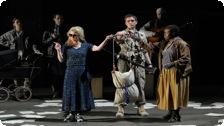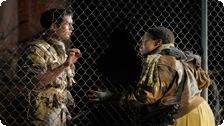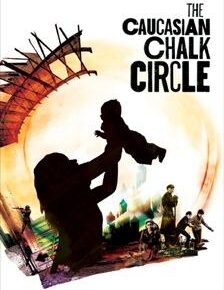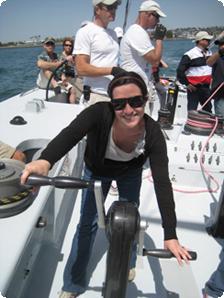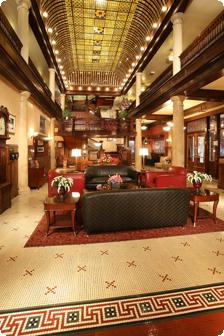Culture: The Caucasian Chalk Circle wasteland transformation project
by Evan Karp
John Doyle’s reimagination of Bertolt Brecht’s The Caucasian Chalk Circle is a challenging, stripped-sown performance being staged now in San Francisco’s American Conservatory Theater. Although this production ultimately fails to achieve its desired interaction with the audience, Doyle does confront many of the issues attached to modern theater in innovative ways and the results are sometimes transcendent and overall interesting.
The Caucasian Chalk Circle, originally written in 1944, is a tale about the contradictions inherent in humanity and specifically the disparities between law and morality. True to Brecht, who believed in presenting with each play both a socially-conscious platform and an entertainment-rich experience, Doyle has transformed Chalk Circle into more than just the story of an (unintentionally) abandoned child who is reared by a woman other than the mother, against the odds of poverty and war, and then appointed to one of them by an unconventional judge.
Based on the famed trial in the Old Testament (itself perhaps based on the Buddhist Jataka tales) in which Solomon instructs two women to cut a child in half to determine the real mother, The Caucasian Chalk Circle has heavy socialist undertones. The final words, and self-proclaimed moral is as follows:
“That what is here, should belong to those who deserve it—
The children to the motherly,
So they may thrive,
The wagons to the good drivers,
So they are well driven,
And the valley to those who water it,
So it may bear fruit.”
With this in mind, it is hard to understand why this particular play is being staged right now. It is based in a time of war, but war here represents the inevitable, natural state of man. “Does it need a reason? War, brothers, war,” reflects one of the characters. But another dominant theme is the grounding of culture at a time of great political and social unrest, and the responsibility each individual has to, even in a time of drastic and rapid change, engage in the world and transform it as he or she deems appropriate.
This is apparent in Grusche, the woman who adopts the abandoned child Michael, as she believes in love and does everything she can to protect him—even against her own well-being and comfort and even to the point of marrying someone she doesn’t know only to obtain a birth certificate for the sake of the child’s safety; it is also apparent in the judgments of Asdak, a bawdy but wise alcoholic who is made Judge first for his astute and heartfelt accusations against aristocracy and then (unknowingly) protecting the Prince: he bases all decisions on the whimsical nature of his heart.
One of Doyle’s primary goals in directing The Caucasian Chalk Circle is to instill this responsibility and power into the audience. As he says in an enlightening interview with ACT,
“In this piece we’ve got huge things that we have to do: we have to cross a bridge that nearly breaks, we have to imagine that we are outside a palace, we have to imagine that we’re hiding from the army, and so forth, and yet it’s only nine performers on a pretty empty stage. The audience has to fill in the rest, and that’s what I mean about breaking the fourth wall, really: to try to get away from the passivity of, “Okay, show me,” as opposed to, “Oh, I have to lean in towards this, I have to go towards the storyteller.” That’s what I’d like the audience to feel is happening to them. My job is to set up a world that accesses that.”
When he references the fourth wall he refers to the barrier between audience and actors, which in this production consists of a chain-link fence where the curtain would be—a barrier that carries even more connotation, but one we can all see through. Behind this ‘wall’ is an open stage littered with crumpled papers and discarded objects, relics of culture that swirl—whether by the hands of humans or nature—through a wasteland.
But as Grusche coos to Michael as he attempts to breast feed: “There’s nothing in there but you think you’re drinking, and that’s something,” every human experience is largely dependent on belief, which in turn has the power to affect our realities. In other words, we should remember to engage ourselves instead of merely processing information.
This may well provide the key to The Caucasian Chalk Circle’s timeliness. Here the information age is old news. We depend on these future relics of technology and interaction and, in an intangible way, they define us. Brecht’s, and Doyle’s, admonition: use what you need, take what you should have, believe in what you are and act accordingly, or end up like the governess, the actual mother of Michael who forgets him as she flees from danger because she’s obsessed with her wardrobe: bereft, sterile, and on her knees, imploring the very system she exploited to restore her humanity.
“If theater has a future, and I do believe it has or I wouldn’t be sitting here talking to you,” Doyle says, “it is to explore with the audience the fact that we are theatrically storytelling. As opposed to putting movies onstage, or doing the real thing. I have discovered more and more that when I try to reenact something onstage “for real,” it’s not as good as reality. It can’t be. So I have to try to enact something that asks the audience to participate in that vision of reality, and then it’s theater. Because they’ve filled in the gap.”
WHO:
Written by Bertolt Brecht
Translated by Domenique Lozano
Directed and designed by John Doyle
Composition and musical direction by Nathaniel Stookey
Designed by Jane Cox (lighting designer)
Featuring René Augesen* (ensemble), Nick Childress** (ensemble), Manoel Felciano*
(ensemble), Anthony Fusco* (ensemble), Rod Gnapp (ensemble), Caroline Hewitt**
(ensemble), Omozé Idehenre** (ensemble), Gregory Wallace* (ensemble), Jack
Willis* (ensemble)
*A.C.T. core acting company member
**Member of the A.C.T Master of Fine Arts Program class of 2010
WHERE: American Conservatory Theater
415 Geary Street, San Francisco, CA 94108
WHEN: February 18–March 14, 2010
Tue.–Sat. at 8 p.m. (3/2 performance at 7 p.m.)
Wed., Sat. & Sun. at 2 p.m.
InterACT Events:
Postperformance Audience Exchanges…….3/2 (7 p.m.), 3/7 (2 p.m.), 3/10 (2 p.m.)
OUT with A.C.T………………………………………….3/3 (8 p.m.)
Bike to the Theater Night……………………………3/4 (8 p.m.)
HOW MUCH: $10–$82
Premiere | Orchestra | Dress Circle | Balcony | 2nd Balcony
Weekend $82 | $67 | $57 | $41 | $22
Weekdays $71 | $57 | $47 | $34 | $17
Previews $57 | $47 | $37 | $27 | $10
Weekdays ($17–$71): Tue. 7 p.m., Tue.–Thu. 8 p.m., Fri. 8 p.m., Sun. 7 p.m., Wed. 2 p.m.
Weekend ($22–$82): Sat. 8 p.m., Sat. & Sun. 2 p.m.
TIX & INFO: 415.749.2228 | www.act-sf.org
All photos by Kevin Berne
Discover more from Tango Diva
Subscribe to get the latest posts sent to your email.

